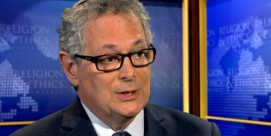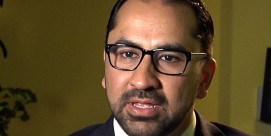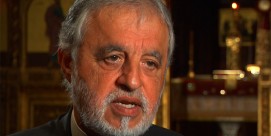In This Episode << SLIDE LEFT TO SEE ADDITIONAL SEGMENTS
James Merritt Extended Interview
Read excerpts from Jeff Sheler’s interview with Southern Baptist Convention President James Merritt:

On diversity and Southern Baptist evangelism:
If you trace back to our history, especially in the fifties and maybe somewhat even the early sixties, I think we saw a tremendous explosion of growth. We probably had even more of an emphasis on evangelism than we have now. Quite frankly, as president, that is a concern I have — that we keep our focus on evangelism. That’s been one of our hallmarks. One of the distinctive marks of Southern Baptists is our emphasis on evangelism and sharing the gospel, the belief that Christ is the only way to Heaven. If we ever get away from that, quite frankly, no matter what else we believe or what else we do, that’s when we will begin to slide in terms of growth and reaching people. There’s no question that there’s far more religious diversity. When I was growing up, you were either Baptist or Methodist. Today, that’s no longer true. There are Muslims here, Buddhists here, Hindus here — every ilk and every type of religious persuasion that you could imagine. Even here in the buckle of the Bible Belt, I have seen a trend in that direction. I’ve also seen, quite frankly, an increasing secularization, even here in the Atlanta area. It’s more difficult now, I believe, to reach people for Christ, in one sense, than it was 15 years ago or so, because of, number one, the increasing secularization of the culture we live in. Number two, we are living in a postmodern society where we’ve gone from saying, “Well, maybe there’s truth and maybe there’s not,” to saying, “Well, even if there is truth, really, it doesn’t matter.” We’re going to have to do a better job, from a pre-evangelism and an apologetical standpoint, to really impact the culture for Christ. I mean softening hearts, making hearts more open to the gospel. It used to be that 20 years ago, most everybody at least owned a Bible, or had read a Bible at some time or other. You could quote Scripture passages and people would be very familiar with them. That’s no longer the case today. I just came back from Louisville, and a man from Denmark got on the plane with me [and] struck up a conversation. [He was] very interested in religion, but as I began to share the gospel, immediately he began to question whether or not Christ was even a real, historical figure — began to question even the truth and veracity of the Scripture. Thirty years ago, 65 percent of the American public agreed with the statement, “The Bible is the true word of God.” Today, only 32 percent of America agrees with the statement. You had more common assumptions with people, in general. That’s no longer the case today when it comes to Christ and Christianity.
On the challenges religious diversity poses:
One of the things that I’m grateful for in America is that we do have religious diversity. I made a statement on one of the news talk shows right after the 9/11 situation. I said, “You know, what really troubles me that the media doesn’t talk about very much is that Muslims can come over here and build mosques in America, which I will defend their right to do, but we can’t go to most of their countries and build churches.” They have religious freedom here, but we don’t have the same religious freedom they have. And I defend that freedom and welcome it.
Being a Christian, I believe that Christianity and the truth claims of Christianity — we’re ready to go toe to toe in the marketplace of ideas and hold our own against anyone. But I do think there’s a multifaceted challenge. Number one, obviously, is the challenge of reaching over [to] people of other religions and other faiths, such as Islam or Buddhism, for example, and winning them over to Christianity, to faith in Christ. I think that you have a lot of what I would call, at best, “nominal Christians” who are now willing to dabble and experiment in some of these other faiths and other religions, whether it be New Age or whatever. There’s a third challenge now that’s more important than ever — that we teach our own people what we believe and why we believe it. I think, quite frankly, that’s a weakness even in the Baptist Church. A lot of Baptists I don’t even think are really sure what they believe about a lot of things. And even if they are, they really can’t give an articulate defense of what they believe, which is part of our responsibility as Christians.
On participating in interfaith dialogue:
Historically, we have not. I’m certainly not opposed to being in a dialogue with others who want to honestly exchange ideas. But I think what you have to be careful of — a lot of times people take association as confirmation. And a lot of times what people are interested in, in these interfaith gatherings, is basically, “Let’s all come together and,” implicitly, “let’s affirm the truth claims of one another, and let’s affirm that we’re all equal and that your claim is no more valid than mine, and mine is no more valid than yours.” And, obviously, as a Christian, believing that Christ is not just a good way to heaven or the best way to heaven or even the baddest way to heaven, [but] that he is the only way to heaven, we can’t compromise that singular belief. So we have tended as Baptists not to engage in many of those types of activities.
On whether there is truth in other religions:
Oh, absolutely. You know, there’s a book that was written years ago by a philosopher that says all truth is God’s truth. For example, when a religion says we ought to be kind to one another, or we ought to help those in need — well, that’s obviously a truth. I don’t know of any Baptist or any real, informed Christian who says, “Well, we have all the truth, and no one else has any of the truth.” I do believe there is truth in other religions. However, I do believe that in most other religions there’s just enough truth, quite frankly, to be dangerous. This man from Denmark said, “One of the problems I have with Christianity is its exclusivity. You know, you believe that you have the truth of salvation and that Christ is the only way.” As I said to him — and this is what we say to others (I know, in a day of political correctness and diversity, it sounds arrogant to say it, but I’m not the one that said [it]): “I am the way, the truth and the life, and no one will come to God, unless he comes through me.” That’s what Christ said. And if I’m going to be faithful to him, in my faith in him I have to say the same thing that he said.
On tolerance and engagement:
Well, Jesus said you ought to love your neighbor as yourself. He didn’t say, “Only if he’s a Baptist neighbor or a Methodist neighbor.” He said, “Love your neighbor as yourself.” I lived next to a Muslim family from Pakistan until we just recently moved. I think they would tell you that we were good neighbors, we were kind neighbors. We did share our faith in Christ with them, shared a witness with them. But at the same time, their boys played basketball with our boys, and we treated them as friends and wanted them to be friends.
There is never an excuse for a Christian to be unkind, to be ungracious. I certainly believe that we ought to be tolerant — respecting other people’s faiths and other people’s right to believe the way they want to believe. All that we ask [is] that you be tolerant not only of our right, but our responsibility to evangelize and to share with you what we believe to be the real truth of salvation.

On targeting other religious groups for conversion:
First of all, I don’t really like the word “target.” At the same time, I would say the whole world’s our target. We’re not just targeting Jews or Hindus or Buddhists or whomever. I’m willing and able and eager to talk to anyone, anytime, at any place I can about Jesus Christ and how Christ can change their life. On the other hand, I think my biblical answer is we must obey God rather than men. Quite frankly and honestly, I don’t fear political correctness. We talk about tolerance, and I find it interesting that those who scream the loudest to be tolerant seem to be intolerant of what our biblical mandate is. I don’t talk to people about Christ just because I want to, though I do want to. I’ve been commanded to. The moment I became a Christian, I enlisted in the army, so to speak.One of my marching orders was to go into all the world and preach the gospel. We want to do it in a sensitive way. We want to do it in a way that is least offensive as possible. But Saint Paul talked about the offense of the gospel, and the cold, hard fact is that when you say, in this world that we’re living in today, “Jesus Christ is God’s only way to heaven” or “The cross is God’s only way of salvation,” you’re going to offend people.
I don’t care how kind you say it. I don’t care how much you smile when you say it. It’s offensive, but that’s a part of our message, and that’s a part of who we are. And we cannot back away from preaching that message. I define a good Christian as someone who follows the teachings of Christ and obeys the commands of Scripture. And evangelism for the Christian is not an option. It’s an obligation. I am as obligated to share my faith in Christ as you and I are obligated to pay taxes on April 15th. Now, quite frankly, I get a whole lot more joy out of evangelizing than I do out of paying taxes. But the fact of the matter is both are responsibilities, and it’s incumbent upon every Christian to share his faith in Christ.
On sharing the faith:
If what I believe is true, the most civil thing that I can do is to share my faith in Christ. The most uncivil thing I can do is to say, “Well, even though Christ is the only way, and even though you’re going to wind up eternally separated from God if you do not receive Christ, I’m going respect you to the point that I’m not going to share with you how to go to heaven — even though the Golden Rule says I ought to do unto you the way I’d want you to do unto me.” If the gospel is true, and if you were a Christian and I were not, the Golden Rule would say you ought to share Christ with me, because that’s what you want me to do for you. That never gives us an excuse to do it in an arrogant fashion, an insensitive fashion. The man I was talking to on the plane — every time I went to dialogue with him, I always asked his permission. I had my Bible. The reason he asked me about Christ [was] I was reading my Bible. He says, “I see you’re reading the Good Book,” and so we got to talking. Every time I wanted to share a truth with him, I would say, “Could I show you something in the Bible?” He would say, “Yes.” There have been times I’ve been on airplanes and struck up a conversation. A man would say, “You know, I’m really not interested. I don’t even want to talk about that.” I stop. I respect his right, and so there’s no need to cross over that line. But at the same time, we ought to take every opportunity we can in a gracious and loving fashion to share the gospel of Christ.
On religious truth:
As a Christian, I have to measure any so-called “truth” from another source by the truth I find in the word of God. If there is any truth I find that lines up with the word of God, then I would have no problem with that. In one of the religions, they believe in the virgin birth. And they believe Jesus was a great prophet. But they deny that he literally died on the cross, and they deny that he was literally raised from the dead. And yet, they call him a great prophet. Well, the fact of the matter is if Jesus Christ really did not die on the cross, and he really was not physically raised from the dead, he’s not only not a great prophet, he’s the greatest liar in history, because he is the one who said he was dying for our sins, and he is the one who claimed to have been raised from the dead. When I say that in a lot of religions there’s that small amount of truth that will hook you, there’s [also] that great amount of error that can deceive you.
On seeking out the unchurched:
One of the greatest ways (it will always be; it’s been this way for 2,000 years in Christianity) is for Christians to develop relationships with non-Christians. One of the greatest assets, for example, our church has — or any church — is people who work in the marketplace, people who work for CBS, or Delta Airlines, or IBM. They can be “salt and light” where they are, and they can begin to develop friendships and relationships and, hopefully, use that relationship and friendship as a bridge to begin to talk about Christ, to begin to invite people to church.
Another way that we relate to the unchurched is by offering ministry to hurting people. One thing that is true about this world — no matter whether you’re Baptist, Methodist, Buddhist, or Hindu, or whatever — the world is full of hurting people. It doesn’t matter whether you’re in Bethlehem or whether you’re in Birmingham. People are hurting. They battle sorrow, they battle suffering, they battle sickness, they battle loneliness. I just did a series of television messages called “How to Deal with How You Feel” — things like depression, bitterness, anger, and so forth. We had some of the absolute greatest response of people calling in and saying, “I want to receive Christ as my Lord,” because you’re touching a need, and you’re touching a nerve where people are hurting.
I think the third thing that we need to do is make sure that we’re relevant to where people are. The Bible is relevant. We don’t have to make the Bible relevant. But even in the messages that we preach and the way we package the message, we need to show people how the message that we preach can not only get you to heaven — that is true. But the message that we preach can even help you live the best life you could possibly live on this planet right now. On the prospect of softening Christian beliefs in the face of growing religious diversity:
Do I fear that on a massive scale? No, I don’t fear that at all. What I do believe, though, and what I do fear for our people is this constant hammering on the theme of diversity and tolerance and political correctness — on not trying to emphasize that “we have the truth,” that there are truths in all religions, that your opinion is as good as mine; your faith is as good as mine, all that matters is that you be sincere in what you believe, and I be sincere in what I believe. You hear it all the time. You hear it from every nook and corner. It’s like a Chinese water torture. I mean, it wears on you after a while.
I have some concern that there might be those who, quite frankly, are more influenced by the culture than they are by the church and by the Scripture. But I would say for the vast majority of our people who regularly attend our fellowship and are under the strong teaching of Scripture, that is not a concern for me at all.
On viewing other religious faiths as competitors:
Oh, no question. The sad thing is that, in a sense, not all these other religions do try to evangelize as we do. But, obviously, there are some who do. And you know, that doesn’t surprise me. It’s [been] going on for thousands and thousands of years. And as long as the church is here, we’re never going to have a monopoly on the market by any stretch of the imagination. We’re just like everybody else. Jesus said the kingdom of God is taken by force. When I say “aggressive,” I don’t mean that in a militant sense, but I do mean that in a methodological sense. We’re going to have to be aggressive. We’re going to have to be courageous. We’re going to have to be fearless, compassionate. But at the same time, we’re going to have to have a determination that the gospel is God’s message of salvation; that Christ is God’s way of salvation. As the Apostle Paul said, “I am not ashamed of the gospel of Christ. It is the power of God and the salvation to everyone who believes.” And we’ve got to continue just to keep preaching that message as much as we can.
On the prospect of American culture becoming less Judeo-Christian:
This country was founded on the Judeo-Christian ethic. The coin that says, “In God We Trust” — the common understanding is that is the God of Abraham, Isaac, and Jacob. That is the God of the Ten Commandments. That is the God of the Bible. Even though I welcome Muslims and I welcome Buddhists and I welcome Hindus into the country, I hope that we can somehow stop what I see as a potential balkanization of this country. Theodore Roosevelt said, “I don’t believe in hyphenated Americanism.” He said, “I’m an American, period.” I would say to anyone who comes in this country, whether they’re of my religious faith or not, “I’m glad you’re here. We welcome you with open arms. We think you have much to offer our nation. I want you to know that I would shed my blood for you to believe what you believe and to practice your religion the way you want to practice it. At the same time, there is a culture here, there is a morality, there is an ethos here that has been here for over 200 years. It was the [Judeo-Christian] ethos upon which this country was founded. And we would hope that, as a good American, you would adopt that same ethos, which has served us so well.”







